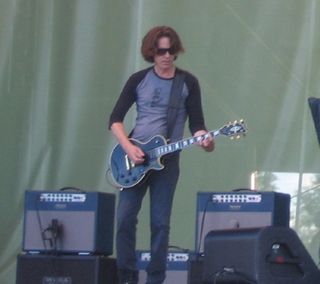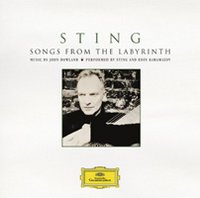
John Dowland was an English Renaissance composer, lutenist, and singer. He is best known today for his melancholy songs such as "Come, heavy sleep", "Come again", "Flow my tears", "I saw my Lady weepe", "Now o now I needs must part", and "In darkness let me dwell". His instrumental music has undergone a major revival, and with the 20th century's early music revival, has been a continuing source of repertoire for lutenists and classical guitarists.

Gordon Matthew Thomas Sumner, known as Sting, is an English musician, activist and actor. He was the frontman, principal songwriter and bassist for new wave band the Police from 1977 until their breakup in 1986. He launched a solo career in 1985 and has included elements of rock, jazz, reggae, classical, new-age, and worldbeat in his music.
An air is a song-like vocal or instrumental composition. The term can also be applied to the interchangeable melodies of folk songs and ballads. It is a variant of the musical song form often referred to as aria.
Thomas Robinson was an English Renaissance composer and music teacher, who flourished around 1600. He taught and wrote music for lute, cittern, orpharion, bandora, viol, and voice.

Dominic James Miller is a British guitarist. With much of his career as a sideman and guitarist for singer Sting, he has also released several solo albums.
Robert Johnson was an English composer and lutenist of the late Tudor and early Jacobean eras. He is sometimes called "Robert Johnson II" to distinguish him from an earlier Scottish composer. Johnson worked with William Shakespeare providing music for some of his later plays.

During the reign of Queen Elizabeth I (1558–1603), English art and high culture reached a pinnacle known as the height of the English Renaissance. Elizabethan music experienced a shift in popularity from sacred to secular music and the rise of instrumental music. Professional musicians were employed by the Church of England, the nobility, and the rising middle-class.

Jozef van Wissem is a Dutch minimalist composer and lute player based in Brooklyn. In 2013 Van Wissem won the Cannes Soundtrack Award for the score of Only Lovers Left Alive at the Cannes Film Festival.

Songs from the Labyrinth is the eighth studio album by British singer-songwriter Sting. On this album, he collaborates with Bosnian lutenist Edin Karamazov. The album features music by John Dowland (1563–1626), a lutenist and songwriter. It entered the UK Official Albums Chart at number 24 and reached number 25 on the Billboard 200. The release was a slow seller for a Sting album, his first since 1986's Bring on the Night to fail to break the UK top 10.
Edin Karamazov is a Bosnian musician, lutenist and guitarist.
"Flow, my tears" is a lute song by the accomplished lutenist and composer John Dowland (1563–1626). Originally composed as an instrumental under the name "Lachrimae pavane" in 1596, it is Dowland's most famous ayre, and became his signature song, literally as well as metaphorically: he would occasionally sign his name "Jo: dolandi de Lachrimae".
"I Saw My Lady Weep" is a lute song from The Second Book of Songs by Renaissance lutenist and composer John Dowland. It is the first song in the Second Book and is dedicated to Anthony Holborne. It is an example of Dowland's use of chromaticism.
The Second Book of Songs is a book of songs composed by Renaissance composer John Dowland and published in London in 1600. He dedicated it to Lucy Russell, Countess of Bedford.

Lachrimæ or seaven teares figured in seaven passionate pavans, with divers other pavans, galliards and allemands, set forth for the lute, viols, or violons, in five parts is a collection of instrumental music composed by John Dowland. It was published by John Windet in 1604. It consists of a set of seven slow pieces which the composer calls tears plus other pieces including some livelier numbers.
"In darkness let me dwell" is a song ascribed to the lutenist and composer John Dowland. Published in 1610, late in Dowland's career, the song shows the influence of Italian music of the early baroque. It was published as song no. 10 in A Musical Banquet, a 1610 anthology of songs for lute and voice from England, France, Italy, and Spain compiled by Robert Dowland, John's son. "In darkness let me dwell" has been recorded by many artists, notably by on the 2006 album Songs from the Labyrinth by Sting with Edin Karamazov.
"Will Yow Walke the Woods soe Wylde" is the title of a song from the Tudor era, popularly believed to have been a favourite of Henry VIII. The complete text of the song has not survived, but contained the short refrain:
Ronn McFarlane is an American lutenist and composer, most notable as an interpreter of Renaissance music. He formerly taught lute at the Peabody Conservatory, and has recorded many albums as a solo performer and in collaboration with others, including the groups Ayreheart and The Baltimore Consort, and as a guest artist for countless other groups. He resides in Portland, Oregon, and continues to perform and compose to this day.
Christopher Wilson is a British lutenist who has performed widely and recorded several albums.

"Can She Excuse My Wrongs" is a late 16th-century song by the English Renaissance composer John Dowland, the fifth song in his First Booke of Songes or Ayres. The words are set to a dance-tune, a galliard.

The First Book of Songs is a collection of songs by John Dowland which includes one instrumental piece. The book was published in London in 1597 and was reprinted four times during the composer's lifetime.







